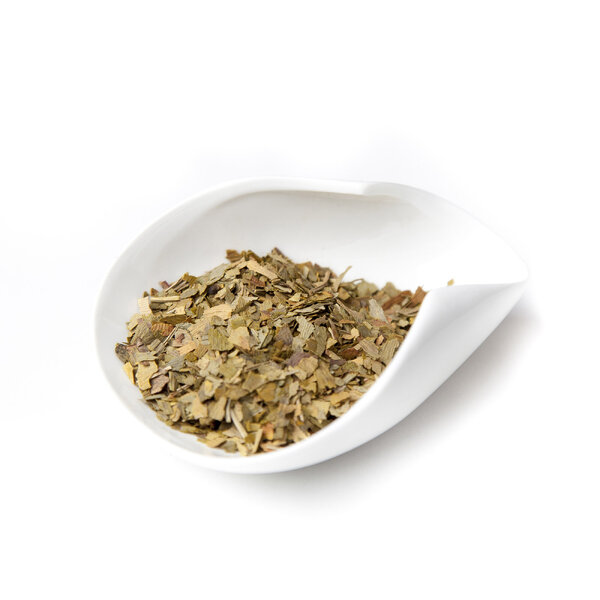Ginko Biloba Broken
-
Country of Origin China
-
Type of Tea Herbal Tea
-
Total Price: from 2.00 € (including VAT)
Ginkgo Biloba is one of the most effective medicinal plants, often popularly referred to as a "miraculous cure-all." Chinese medicine has recognised and used Ginkgo for at least 5,000 years.
Ginkgo Biloba is among the oldest medicinal plants, renowned for its beneficial effects on memory, concentration, and blood circulation. It is an ideal solution for those suffering from cold hands and feet, while also supporting the overall vitality of the body.
Tea Preparation for Single Infusion
-
Tea Quantity 5 g
-
Water Quantity 0,5 l
-
Water Temperature 100 °C
-
Brewing Time 5 - 10 min.
-
Number of Infusions 1
-
Tea Characteristic bez kofeínu
Ginkgo biloba is one of the oldest known medicinal plants, and its effects have been extensively studied. While many claims about Ginkgo are popular, not all are scientifically confirmed. Here are the evidence-based benefits of Ginkgo biloba according to available studies:
- Improved Blood Circulation
Ginkgo biloba has the ability to dilate blood vessels and enhance blood flow, which can be beneficial for peripheral circulation disorders (e.g., cold hands and feet) and reduced blood flow to the brain.
Supported by studies: Some clinical trials have confirmed improvements in microcirculation and oxygen supply to tissues. - Support for Cognitive Function
Ginkgo is often used to enhance memory, concentration, and mental clarity, particularly in older adults.
Supported by studies: Moderate benefits have been demonstrated in patients with mild cognitive impairments.
In conditions such as Alzheimer’s disease and dementia, Ginkgo extracts (especially EGb 761) may slightly improve memory and daily functioning. - Antioxidant Properties
Ginkgo contains flavonoids and terpenoids, which are powerful antioxidants. These compounds help neutralise free radicals that can damage cells and contribute to ageing and chronic diseases.
Supported by studies: Antioxidant effects have been well-documented in laboratory settings. - Relief for Tinnitus (Ringing in the Ears)
Ginkgo is sometimes used to alleviate tinnitus symptoms, though evidence of its effectiveness is mixed.
Supported by studies: Some research shows mild improvement in tinnitus patients, but results are inconsistent. - Reduction in Anxiety Symptoms
Ginkgo may help reduce feelings of anxiety, likely due to its adaptogenic properties.
Supported by studies: Randomised trials have indicated that Ginkgo may be effective for mild forms of anxiety. - Vision Support
Improved blood flow to the retina may benefit certain eye conditions, such as glaucoma or age-related macular degeneration.
Supported by studies: Small studies have shown potential benefits, though more research is needed. - Neuroprotection
Ginkgo has neuroprotective properties and may help protect nerve cells from damage.
Supported by studies: These effects have been observed in preclinical studies and in some neurological disorders. - Assistance with Intermittent Claudication
Ginkgo may help alleviate pain during walking caused by reduced blood flow to the legs.
Supported by studies: Evidence suggests Ginkgo can increase the distance patients can walk without pain.
Additional Claims:
Some effects are commonly cited but lack sufficient evidence:
- Cancer prevention or treatment: No strong evidence supports Ginkgo's effectiveness against cancer.
- Improved athletic performance: Not scientifically validated.
- Treatment for depression: Evidence is limited and inconsistent.
Precautions
Effects on blood clotting: Ginkgo can reduce blood clotting, so it should not be consumed before surgery. It is essential to discontinue Ginkgo well in advance of any planned operation to avoid excessive bleeding.
Ginkgo remains a valuable medicinal plant with multiple proven benefits, though it is essential to approach its use with realistic expectations and under the guidance of a healthcare professional.
Interesting Facts
Ginkgo's largest prevalence was during the Mesozoic era, making it the most famous "living fossil" in the plant kingdom.
In Asian countries such as Japan, China, and Korea, Ginkgo is considered sacred and was traditionally planted around temples. During the leaf-fall season, people would gather near the tree, bow to it, and respectfully collect its fallen leaves.
One of the most remarkable stories involving Ginkgo comes from the end of World War II. When the atomic bomb was dropped on Hiroshima, a church approximately one kilometre from the explosion's epicentre was destroyed. However, a Ginkgo tree in its courtyard survived the devastating blast with little damage. When the church was rebuilt after the war, the now-thriving Ginkgo tree stood in the way of construction. Rather than cutting it down, the design of the church was modified to incorporate the tree, with the steps of the church splitting around it. Today, a plaque near the tree reads, "No more Hiroshima."
Several ginkgo trees survived the Hiroshima bombing, including one at Shukkei-en Garden, and are regarded as symbols of resilience and hope.
